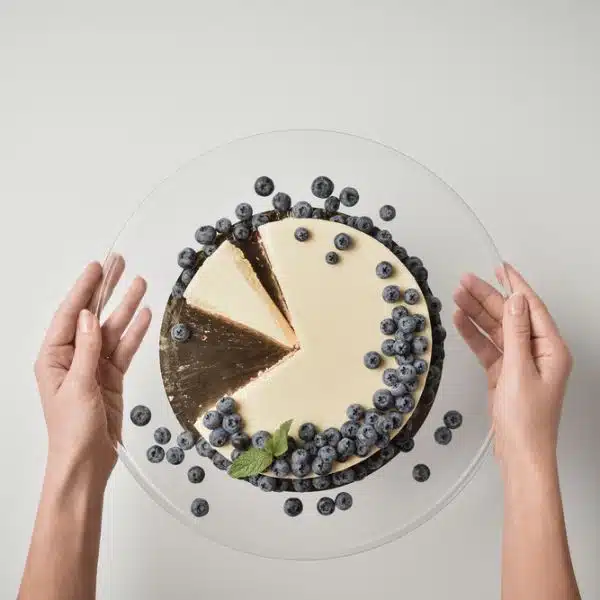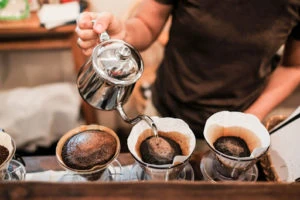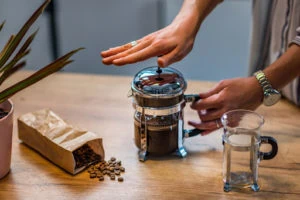Cheesecake is one of those rare treats where we try to assert our self-control to make it last. Naturally, it leads one to wonder, how long does cheesecake last in the fridge, anyway?
No-bake cheesecake has the shortest shelf-life, as it freezes poorly. and will last for 3 to 5 days in your refrigerator – although after 3 days the crust may be of poor quality. Baked cheesecake is more robust, and should last for 5 – 7 days in your refrigerator, and store-bought cheesecakes will typically last a full 7 days unopened. Baked or store-bought cheesecakes may also be frozen, in which case they’ll last up to 3 months!
While that’s the ‘fast answer’, like the treat itself, this is a subject that it’s better to take our time with. Today we’re going to take a closer look at cheesecake ingredients to better understand its perishability, storage methods for keeping it longer, and how to tell when cheesecake has gone bad.
Along the way we’ll throw in some useful tips, so if you’re ready, then let’s talk about creamy, delicious cheesecake and the keys to making it last!
Understanding why cheesecake goes bad

To better understand why the ‘clock is ticking’ with your delicious cheesecake, it pays to know what’s inside these creamy confections – and confections they are.
Despite having ‘cake’ in the name, a cheesecake is technically considered a type of confection called a ‘tart’. This just means that it’s an open-topped, baked dish that is filled over a pastry base.
Considering the ingredients

To give you an idea of what is inside, we’ll go with a classic cheesecake recipe, in this case ‘Classic Cheesecake’ from Sally McKenney of Sally’s Baking Addiction. We’re just going to use the ingredients by way of example, but if the recipe tempts your tummy, then be sure to visit the link. Sally really knows her stuff!
The ingredients for this classic cheesecake are the base of many cheesecake recipes that you’ll find, and includes the following:
- 32 ounces full-fat brick cream cheese
- 1 cup granulated sugar
- 1 cup full-fat sour cream
- 1 tsp pure vanilla extract
- 2 tsp fresh lemon juice
- 3 large eggs
We’re leaving out the graham-cracker crust, but this recipe gives you an idea of what we are dealing with from a perishability angle. Let’s look at each ingredient individually to see how it plays:
- 32-ounce full-fat brick cream cheese – Cream cheese is the second most robust of the ingredients, as you can use it for up to 10 days as long as you stick it back in the fridge.
- 1 cup full-fat sour cream – Sour cream is the toughest, lasting up to 2 weeks if you stick it back into the fridge.
- 3 large eggs – Eggs are where we get into a little trouble from a refrigeration standpoint – with eggs in a recipe, this is what takes us down to the 5 to 7-day mark (and some insist that 4 days should be the longest refrigeration time where eggs are concerned)
While some lemon juice is added in the recipe that will certainly come into play, we’re not going to conjecture on that – the goal here is just to break it down to the ‘problem ingredients’ so that you better understand why cheesecake doesn’t last so long with only standard refrigeration.
With that said, let’s explore the different refrigeration options to see how we can ‘tweak’ your cheesecake shelf-life a little.
Storing cheesecake -Options and useful tips

Chilling your cheesecake in some form or fashion is an absolute must – after all, these tarts are pretty much dairy and eggs – and you can only leave a cheesecake sitting at room temperature for 2 hours before it’s considered a health risk.
Let’s look at the different options and if any tweaks come to mind, we’ll be sure to share them along the way!
Refrigerator
If you will be refrigerating your cheesecake, then the first thing to consider is if it’s no-bake or the bake variety. ‘No bake’ cheesecake will only last for 3 to 5 days, while a baked cheesecake should be good for 5 to 7 days.
Here are some quick considerations when refrigerating your cheesecake:
- If it’s a store-bought cheesecake, remember to buy it last on your way out of the store – that way it will already be cold. If you grab it too early, it will thaw out, and this gives bacteria a head start on reducing the shelf life of your cheesecake.
- Store in airtight plastic or glass containers – not metal. With metal, there’s a chance of the ingredients reacting with the metal and making your cheesecake inedible.
- 35 to 45 degrees Fahrenheit is the ideal storage temperature for keeping your cake edible the longest.
- If you notice any leakage outside of the graham crust, this may be a sign that your cake has been in the fridge for too long and may have gone bad.
- If you’ve just made a cheesecake to serve with dinner, stick it in the refrigerator as soon as possible – any time in room temperature starts the ‘bacteria clock’, so just cut out a wedge of the cake to keep separate in the refrigerator until it’s time to serve, while storing way the rest of the cake as whole or separate pieces that you can freeze right away or simply store in plastic or glass in the fridge for later.
Freezer
Storing your cheesecake in the freezer is the go-to method for most of us and it works pretty well – as long as it’s a baked cheesecake. No-bake cheesecakes, sadly, don’t freeze well and the process tends to affect the consistency, but a baked cheesecake (homemade or store-bought) may be frozen for up to 3 months.
There are a few considerations to keep in mind when you are freezing your cheesecake, so here are some things you should think about when storing your delicious cheesecake:
- Whole vs. slices – If you are looking to enjoy your cheesecake for the longest time possible, consider freezing it in individual slices. Taking out the whole cake and slicing bits off as you go exposes the cake to temperature changes and microorganisms in the air, but with slices, you can just take out what you need.
- Keeping garnish separate – If you are making a baked cheesecake that you know you’ll be freezing right away, then consider not adding the garnish until you are ready to eat it. Depending on what you are using, it may freeze differently and the topping will have shelf-life considerations of its own. You don’t HAVE to do this, but it can make a lot of difference in the taste if your topping doesn’t freeze as ‘cleanly’ as your cheesecake.
- Freezer Burn issues – If your last cheesecake suffered from freezer burn, then consider a different storage trick – wrap the cake piece tightly in plastic wrap, and then wrap it again in tin foil. This should help to keep the freezer burn at bay so that your slices are yummy when you want them.
Vacuum-sealing
The ‘Holy Grail’ of cheesecake storage is actually going to be vacuum sealing. You’re probably wondering, ‘won’t that crush my cheesecake?’ and the answer is ‘yes – if you don’t freeze it first!’. The ideal way to vacuum seal your cheesecake is to cut it into individual slices, freeze those, and then vacuum seal the individual frozen pieces.
If you do this, then your cheesecake will stay fresh and yummy in your freezer for up to a whopping 6 months!
If you don’t have one already, this Shalkk vacuum sealer is a good example, and with it you can vacuum seal cheesecake, meats, fruits, veggies, and all kinds of other favorites to really get the most out of your shelf life. They’re inexpensive and especially useful if you like to cook up lunches for work or prep for special cooking plans well in advance – just something to consider adding to your kitchen arsenal, even if it’s just to protect your beloved cheesecake!
How can you tell if cheesecake has gone bad?

With cheesecake, you’ll have a pretty good chance of knowing when it’s gone bad, as it is seldom a subtle thing (unless it’s at room temperature – in which case, stick to the ‘2 hours then discard’ rule). With a cheesecake you’ve stored and thawed, however, look for common sense signs such as:
- Scent – If your cheesecake has suddenly changed scents – especially if it smells earthy, which indicates mold – or even a little sour, then it’s time to toss it out. Don’t try to just pick out the ‘good bits’ or you may regret it later!
- Consistency – Baked cheesecake freezes really well, so when you thaw it there’s not much of a consistency change normally. If you’ve thawed it out a few times (say, you froze the whole cheesecake and you take it out to get slices), then each trip out of the freezer makes a difference. If the cheesecake is no longer as firm and seems watery, then don’t eat it!
- Color – Discoloration of your cheesecake is a good sign that it’s gone bad. You’ll often see it first close to the crust, but any suspicious discoloration is all the excuse you need to chunk that cheesecake into the trash.
- Crust – If the crust has gone soggy especially if something is leaking through, then it’s best not to chance eating the cheesecake. Likely bacteria have been busy and eating the cheesecake could be a very real risk for food poisoning.
FAQs
We’re just about to call it a day and wrap things up, but before we do, we’ve got a few frequently asked questions on the subject of cheesecake and its shelf life. Let’s take a look and if you find something useful, then be sure to hang on to it and put it to good use!
Can you eat cheesecake after 7 days?
Technically you can but we definitely don’t recommend it – with no-bake cheesecake, you’ve got 3 days in the fridge, baked lasts 5 to 7 days, and store-bought usually lasts a solid 7. Per the USDA, however, 3 to 4 days is optimal, so you’ll need to use your best judgment or better yet – hedge your bets by freezing solid pieces and vacuum sealing them. That gives you a window of 6 months to eat that cake!
Should you refrigerate the cheesecake covered or uncovered?
Always covered. An uncovered cheesecake is going to spoil faster and you’ll always have a chance of other items in the fridge imparting an unpleasant smell to your cheesecake. When putting it into the fridge, place it in an airtight plastic or glass container, or simply plastic wrap it and then give it a second layer of foil.
Does cheesecake get harder in the fridge?
Yes! Some folks don’t even like to eat their cheesecake until it’s had a little time to firm up in the fridge. When you’ve just baked a cheesecake, usually the center will be a little on the ‘jiggly’ side, but time in the fridge lets the cheesecake ‘set’ and gives it a firm, perfect consistency.
Like a lot of things in life, waiting for your cheesecake can definitely enhance the experience, so consider letting it settle in the fridge for a while once you’ve baked it – there really is a huge difference.
Some closing words on Cheesecake preservation
In this article, we’ve taken apart cheesecake to its base components to answer the question ‘how long does cheesecake last in the fridge?’. Breaking it down, No-bake cheesecake is best before 3 days but will last up to 5, while baked cheesecake lasts 5 to 7 days in the fridge, and store-bought will usually make it the entire 7-day week.
Don’t forget that taking the cake out increases the odds of it going bad sooner and that you can avoid this by storing separate slices in your fridge or freezer. For the longest preservation, vacuum sealing also kicks up your shelf life to 6 months, although it’s cheesecake so this may be overkill – it’s hard to leave it alone, after all!
If you have some tips or feedback on cheesecake storage, please be sure to leave us a word in the comments – we love the tips that our readers send in and any advice on making cheesecake last is GOLD. Thanks so much for reading and we hope you’ll visit us again soon!





David learned to cook at an early age after his mother told him that he couldn't live on pizza forever, Dave uses his modest kitchen skills to recreate sorely-missed recipes from home and to occasionally make new favorite ones from places he is visiting.